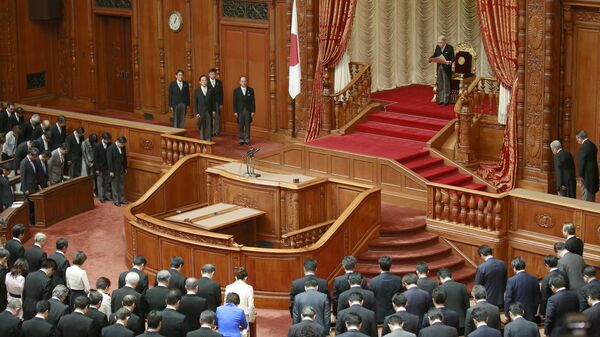The new immigration laws seek to adopt changes as a means to supply the increasingly aging population of the country with a steady supply of foreign workers in manufacturing, service and other so-called blue-collar jobs.
A significant immigration policy shift for Tokyo, the revised laws open the door for an estimated influx of 340,000 foreign workers over the next five years, according to reports.
The new work visa system, coming into effect in April 2019, has dominated government debate in traditionally foreigner-shy Japan, as opposition lawmakers ride a powerful backlash, particularly from those who claim that the new laws are short on specifics, according to the Japan Times.
Last week's revelation about the details of the controversial immigration work program point to what many suspect are exploitative internship practices designed to lock immigrants into contracts at low wages, an echo of the ongoing state-sponsored Technical Intern Training Program (TITP), found to be rife with human rights violations, including harsh working conditions, sexual harassment and below-minimum wages, according to the Japan Times.
An estimated 69 foreign-born work-visa immigrants in Japan died between 2015-2017, including six suicides, according to Tokyo justice ministry data, cited by lawmaker Akira Nagatsuma of the Constitutional Democratic Party of Japan (CDPJ).
Data files obtained by local Tokyo press also revealed a minimum of 11 workers who died while on duty, a nod to the undocumented dangers of certain jobs.
Workers ranging in age from 18-44 who suffered death or injury hailed from Indonesia, Vietnam, Thailand, China, the Philippines.
"This is a devastating, cruel reality," observed CDPJ lawmaker Yoshifu Arita in a plenary session of the Upper House during debates prefacing the bill's passage.
Arita warned that much of the particulars are intended to be worked out after the 2019 enactment of the new visa regime.
"With no clear countermeasure in place, I'm sure the new system will entail similarly serious human rights violations," Arita stated, cited by Japan Times.
Although current TITP workers are thought to be able to shift to the new visa system, opposition voices in Tokyo note that the new and old regimes are markedly different, while Japanese Prime Minister Shinzo Abe has consistently claimed the two are fundamentally different.
The new bill was voted in on Saturday following an unsuccessful last-ditch sabotage maneuver by the opposition on Friday.
"The bill must be enacted swiftly based on thorough and efficient discussions at the Diet in an age when Japan grapples with serious labor shortages," stated ruling Liberal Democratic Party lawmaker Takamaro Fukuoka, during heated pre-passage debate.
Recent polling by local media indicates that the public is more concerned over the speedy debate and passage of the bill, as opposed to any planned influx of foreigners.
The new work visa regime will apply to workers in janitorial, nurseries, fisheries, construction, agriculture, as well as food service and basic hotel services.





